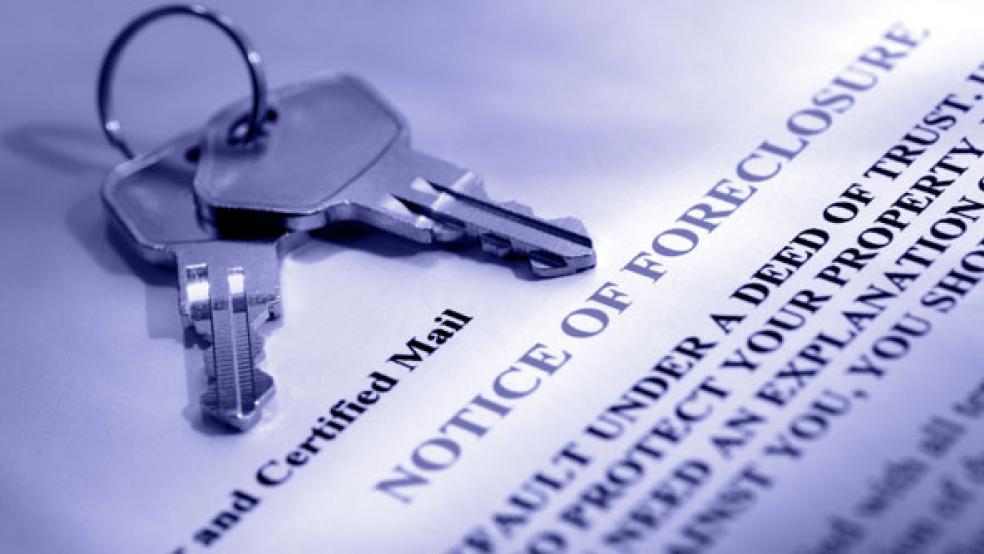Crystal G., 42, figured it was time to move when groups of college students started renting in her condominium complex in Cincinnati, Ohio. She’d bought her apartment in 2005 for $98,000 and had been faithfully paying down a 15-year mortgage. But when the real estate market collapsed and neighbors started suffering foreclosures, her unit’s value plummeted to about $30,000.

As the complex started feeling more like Animal House than home, she approached her bank about refinancing into a 30-year loan so that she could afford to move elsewhere and rent out her condo. But the bank told her it wouldn’t refinance an upside-down mortgage. So she’s planning to stop paying — she heard that missing a payment would encourage the bank to renegotiate her loan.
If it doesn’t, she’s planning to walk away from the mortgage and let the home fall into foreclosure. But she’ll stay in the apartment and save the extra money that would’ve gone toward her mortgage. (She asked that her full name not be used in this story.)
RELATED: Banks Accused of Racial Bias on Foreclosed Homes
Crystal is contemplating what mortgage experts call a “strategic default” — walking away from an underwater home when the borrower has the ability to pay. Her approach appears to dovetail with others trapped in homes worth far less than their original sale price. In a national survey last month by JZ Analytics, 32 percent of the 1,026 U.S. adults polled said homeowners should be able to strategically default on a mortgage without consequences. Seventeen percent said they know someone who’s walked away from their mortgage, and 13 percent said they likely will do so themselves.
“It used to be that a few people might sheepishly admit to having some problems with their mortgage,” says Barry Habib, chief market strategist for mortgage lender Residential Finance Corporation. Today, it’s common for people to suggest to others that stopping payment might be a good financial move, he says.
THE ETHICS OF IT ALL
The ethics of strategic default have been the subject of fierce debate as the number of walkaways has risen. But new research suggests that the argument may be beside the point — the biggest banks might dramatically reduce the number of walkaway borrowers by making inexpensive concessions.
Hard data aren’t available on how many defaults involve people who could pay. But a survey early last year by three economists estimated that the proportion of strategic walkaways rose from 26 percent of all defaults in March 2009 to 35 percent in September 2010. With 15.3 million homeowners (or 31 percent of all homeowners) now paying on houses that are underwater, hundreds of thousands more people may have plans to abandon mortgages that they could continue to pay — a potentially serious hit to a still-fragile housing market.
Strategic defaulters’ ability to pay can range widely, says Frank Pallotta, managing partner at the New Jersey-based Loan Value Group, that develops repayment solutions for lenders. For a single mother who has $10,000 in the bank but is $10,000 behind on payments on a house whose value has collapsed, it may not be wise for her to use her savings to catch up, he says. At the other end of the spectrum are people of means who choose to abandon their loan because their investment will never pay off. These people believe they can improve their financial position in spite of the serious consequences of defaulting — for example, a drop of 200 to 300 points in their credit score or, in some states, the possibility that their bank could attach their other assets.
There’s also a group of accidental strategic defaulters — people told by their bank or loan servicer that they can’t qualify for a modification program unless they skip a payment or two. But when they do, the foreclosure department uses the missed payment to start repossession. In many cases this happens because the servicer has little motivation to modify a loan. Like Crystal G, once the payment has been missed, there’s no guarantee the modification will go through. Many class action suits have been filed around the country over banks’ mishandling of modifications.
Washington, D.C., resident Christie P., 35, and her husband, 48, bought three investment properties starting in 2005 — two in Florida and one in Washington. All three are slightly underwater. But their real problem is negative cash flow; she estimates they lose a total of $2,000 a year across the three. When she called the bank about refinancing, she was denied because the homes are underwater and not owner occupied.
So when her husband retires next year, she says, they’ll default on all three mortgages. “If the banks were giving even a tiny bit on the interest rate… then we’d be more than willing to do our part and sit tight,” she says. (She also asked that her full name be withheld for fear that her husband’s government security clearance could be jeopardized.)
This couple is part of a group of strategic defaulters who have an important characteristic in common: They see their banks as bad citizens. A study
published last month in the Journal of Real Estate Finance and Economics concluded that borrowers who view their loan servicer negatively are more likely to strategically default. That particularly applies to banks they see as stubbornly refusing to work with borrowers in trouble or as having been bad actors during and after the housing crisis, like participating in the predatory lending or robo-signing scandals.
Study author Michael Seiler, a behavioral real estate researcher at Old Dominion University, says the results indicate banks could reduce the number of voluntary defaulters and save money by making small concessions. The study showed, for example, that homeowners offered a $100 reduction (by a theoretical bank) on their monthly mortgage payment were significantly less likely to default: “When you modify loans by even that small amount, that entire effect [the borrowers’ willingness to default] goes away,” Seiler says.
Something similar to that is already being used. Loan Value Group, for example, has a program for lenders in which underwater borrowers get monthly cash rewards for making on-time mortgage payments. The borrower can claim the reward, ranging from 3 to 15 percent of the initial loan balance, only when the loan is paid off, because the term has been reached, the loan refinanced, or the home sold. The company says the program has reduced default rates for their lender clients by up to 50 percent, without changes to mortgage terms.
Seiler also says hedge funds are buying up bundles of low-performing mortgages at bargain-basement prices and then using similar cash incentives to increase the proportion of buyers who repay, reaping big profits in the process.
More consumer education can also help would-be defaulters make better choices, advises Billie Passmore of Orlando-based InCharge Debt Solutions, a U.S. Department of Housing and Urban Development-approved financial counseling agency. She’d never advise a client to default — the consequences for their credit are too dire. For some homeowners, the best option will be to work with the bank to do a short sale, in which the home is sold for less than the amount owed on the mortgage — the bank eats the loss to avoid the far more expensive and protracted foreclosure process. Some banks are offering borrowers up to $30,000 in relocation money if they’ll agree to a short sale in lieu of foreclosure.
Pallotta thinks that giving underwater borrowers incentives could be key to keeping strategic defaults from sending the home market into another downward spiral: “Consumers want to do the right thing,” he says. “We try to give them a reason to do so.”


